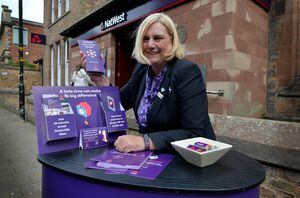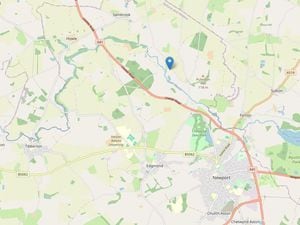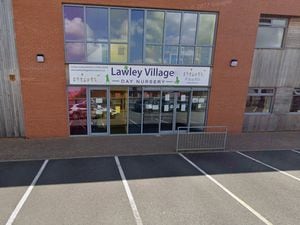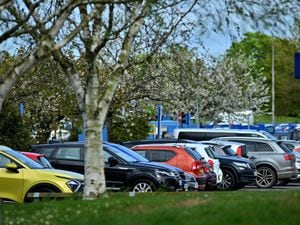Roving banker takes service out on the county's roads
It is not something Jane Hitchen envisaged when she first started working in banking 14 years ago.

"It does seem a bit bizarre talking to somebody about their banking arrangements next to a hospital bed," she says. "At the same time, it gives them a bit of peace of mind, a lot of them are going through rehabilitation and getting ready to go home, and it is important to sort their money out."
Jane is one of three 'community bankers' covering Shropshire. As high street bank branches become increasingly rare, people like her are becoming the main contact that many people have with their banks.
Banks have been disappearing from the county at an alarming rate over the past few years.
Earlier this month, Much Wenlock became a town without a bank after Barclays shut its doors for the last time. Craven Arms was also left without a bank after Barclays closed last year.
In June this year, NatWest closed its Bridgnorth branch, saying that only 65 people a year visited their branch. It came hot on the heels of the closure of the Newport branch closure, following a 28 per cent drop in transactions since 2012. Branches in Wellington, Ellesmere, Whitchurch, Wem and Welshpool have also been lost in recent years. NatWest's parent company also shut its RBS branches in Telford and Shrewsbury, while Barclays shut its branches in Newport and Church Stretton this year.
To help plug this gap, Jane holds 'drop-in' sessions at public libraries in towns where the banks have closed, visits vulnerable customers at their homes and, yes, sometimes visits people in hospital. She admits, though, that the first contact she has with customers during her sessions at public libraries often involves complaints about bank closures.
"The first time people see you in the libraries, they will say 'why have you closed the branch?'," she says. "But then, once they know that you are there, they will start to use the services."
Not everyone who comes to her is a NatWest customer, although Jane says she is limited in the advice she can give to customer of other banks.
"All I can tell them is 'this is the way we would deal with that'," she says.
Drop-in sessions are held every Monday 10.30am-12pm at Bridgnorth library, every Tuesday from 10am-12pm at Newport library, and from 10.30am to 1.30pm every third Friday of the month at Whitchurch library.
When she is not helping customers about day-to-day banking matters, she goes into schools teaching pupils about money management, as well as offering advice about fraud prevention.
Jane, who has been in her role for about 12 months, will typically see about 100 customers a month while on the road, although she does still deal with some customers at the bank's Market Drayton branch.
"In the towns where the branches have closed, we help them with alternative ways to bank," she says.
"If they want to make payments into their accounts, they can use the post office.
"We might also help them with internet banking or using the banking phone app, or telephone banking might suit them better if they don't want to go online."
Internet banking is not for everyone, and Jane concedes that there are many who are still sceptical, particularly regarding security.
"That is an issue, there are people who don't trust it, but our mobile app has never been hacked," she says.
"Our security promise does guarantee that as long as they keep their details safe and secure, we will refund them if any money is stolen from their account. I have never had any complaints about online banking."
What she says is a worry is the growing number of fraudsters issuing bogus invoices, which can lead to people being fleeced out of thousands of pounds.
"Probably the worst case I have seen was about £20,000, where the fraudster engaged somebody in conversation about his internet was running slowly," she says.
"He got him talking, asking for little bits of information over a number of days.
"He then said he had carried out the repair, and asked for a fee, and with the information he had collected was able to take the money out of the customer's bank account.
"In another case, a gentleman was having his roof done, and the fraudster sent emails purporting to be from the roofer asking for payment.
"They probably got the details off the roofer's van, and may have got his email details if he didn't have the proper privacy settings on social media.
"They got him to pay £10,000 to who he thought was the roofer.
"Usually in those cases, the money is pretty much lost. We will try to get back what we can, but the money moves quickly."
As the trend towards bank closures shows little signs of slowing down, people like Jane could increasingly be the main point of contact that many people have with their bank.
"I think more and more people are using online and mobile banking services, and you could say that the physical branch is not needed as much as it used to be," she says.
"You could say that there's a different need to reach out to those vulnerable customers, and not leaving them behind. The physical branches are not needed in the same way."
She also points out that for many of the people she visits in the home, it matters little where their nearest branch is.
"For many of my home visits, it doesn't matter if the branch is 10 miles away or half a mile away, they still can't actually go to it."





